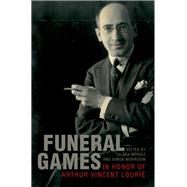- ISBN: 9780199829446 | 0199829446
- Cover: Hardcover
- Copyright: 6/9/2014
Funeral Games in Honor of Arthur Vincent Lourié explores the varied aesthetic impulses and ever-evolving personal motivations of Russian composer Arthur Lourié. A St. Petersburg native allied with the Futurist movement and profoundly sympathetic to Silver Age decadence, Lourié was swept away by the Revolution; he surfaced as a Communist commissar of music before landing in Europe and America, where his career foundered. Making his way by serving others, he became Stravinsky's right-hand man, Serge Koussevitsky's ghostwriter, and philosopher Jacques Maritain's muse. Lourié left his mark on the poems of Anna Akhmatova, on the neoclassical aesthetics of Stravinsky, on Eurasianism, and on Maritain's NeoThomist musings about music.
Lourié serves as a flawless lens through which aspects of Silver Age Russia, early Bolshevik rule, and the cultural space of exile come into sharper focus. But this interdisciplinary collection of essays, edited by musicologists Klára Móricz and Simon Morrison, also looks at Lourié himself as an artist and intellectual in his own right. Much of the aesthetic and technical discussion concerns his grandly eulogistic opera The Blackamoor of Peter the Great, understood as both a belated Symbolist work and as a NeoThomist exercise. Despite the importance Lourié attached to the opera as his masterwork, Blackamoor has never been performed, its fate thus serving as an emblem of Lourié's own. Yet even if Lourié seems to have been destined to be but a footnote in the pages of music history, he looms large in studies of emigration and cultural memory. Here Lourié's life, like his last opera, is presented as a meditation on the circumstances and psychology of exile. Ultimately, these essays recover a lost realm of musical and aesthetic possibilities-a Russia that Lourié, and the world, saw disappear.
Lourié serves as a flawless lens through which aspects of Silver Age Russia, early Bolshevik rule, and the cultural space of exile come into sharper focus. But this interdisciplinary collection of essays, edited by musicologists Klára Móricz and Simon Morrison, also looks at Lourié himself as an artist and intellectual in his own right. Much of the aesthetic and technical discussion concerns his grandly eulogistic opera The Blackamoor of Peter the Great, understood as both a belated Symbolist work and as a NeoThomist exercise. Despite the importance Lourié attached to the opera as his masterwork, Blackamoor has never been performed, its fate thus serving as an emblem of Lourié's own. Yet even if Lourié seems to have been destined to be but a footnote in the pages of music history, he looms large in studies of emigration and cultural memory. Here Lourié's life, like his last opera, is presented as a meditation on the circumstances and psychology of exile. Ultimately, these essays recover a lost realm of musical and aesthetic possibilities-a Russia that Lourié, and the world, saw disappear.







